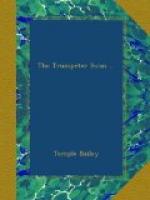Filled, therefore, with a high sense of his philanthropic purpose, he planned a meeting. With his blue eyes on the flying horses, with his staccato voice making quick comments, he had Becky in the back of his mind. He found a moment, when the crowd went mad as the county favorite came in, to write a line on the back of an envelope, and hand it to Kemp, who hovered in the background, giving him quiet instructions.
“Yes, sir,” said Kemp guardedly, and stood at attention until the races were over, and the crowd began to move, and then he handed the note to Judge Bannister.
The Judge put on his glasses and read it. “Where is he?” he asked Kemp.
“In the other box, sir. The one above.”
“Tell him to come down.”
“Yes, sir, thank you, sir.”
The Judge was as pleased as Punch. “That man up there in Waterman’s box has heard of my collection,” he explained to his party. “He wants me to settle a point about the Virginia partridge.”
“Which man?” Randy’s tone was ominous.
Dalton’s arrival saved the Judge an answer. In his hunting pink, with his Apollo head, Dalton was upon them. The Judge, passing him around to the members of his party, came at last to Becky.
“My granddaughter, Becky Bannister.”
With George’s sparkling gaze bent full upon her, Becky blushed.
Randy saw the blush. “Oh, Lord,” he said, under his breath, and stuck his hands in his pockets.
“I’ve always called it a quail,” Dalton was saying.
“You would if you come from the North. To be exact, it isn’t either, it’s an American Bob-white. I’d be glad to have you come up and look at my collection. There is every kind of bird that has been shot in Virginia fields or Virginia waters. I’ve got a Trumpeter Swan. The last one was seen in the Chesapeake in sixty-nine. Mine was killed and stuffed in the forties. He is in a perfect state of preservation, and in the original glass case.”
“I’d like to come,” George told him. “Could I—to-night? I don’t know just how long I shall be staying down.”
“Any time—any time. To-night, of course. There’s nothing I like better than to talk about my birds, unless it is to eat them. Isn’t that so, Claudia?”
“Yes, Father.” Mrs. Beaufort was studying Dalton closely. His manner was perfect. It was, indeed, she decided, too perfect. “He is thinking too much of the way he does it.” The one sin in Aunt Claudia’s mind was social self-consciousness. People who thought all of the time about manners hadn’t been brought up to them. They must have them without thinking. George was not, she decided, a gentleman in the Old Dominion sense. Dalton would have been amazed could he have looked into Aunt Claudia’s mind and have seen himself a—Publican.
“Father,” she said, after Dalton had left them, “did I hear you invite him to dinner?”
“Yes, my dear, but he could not come——”




